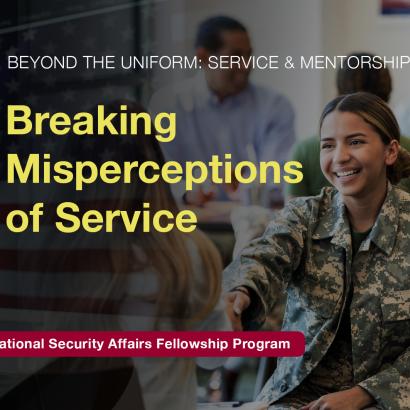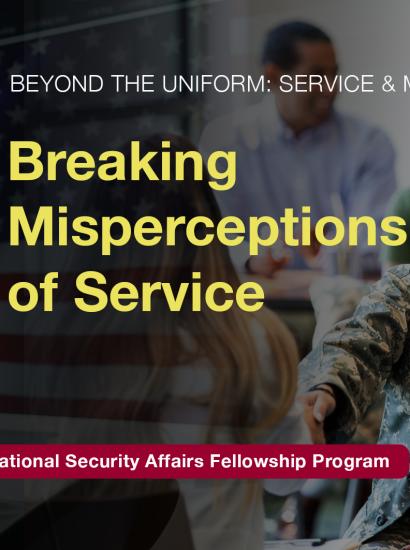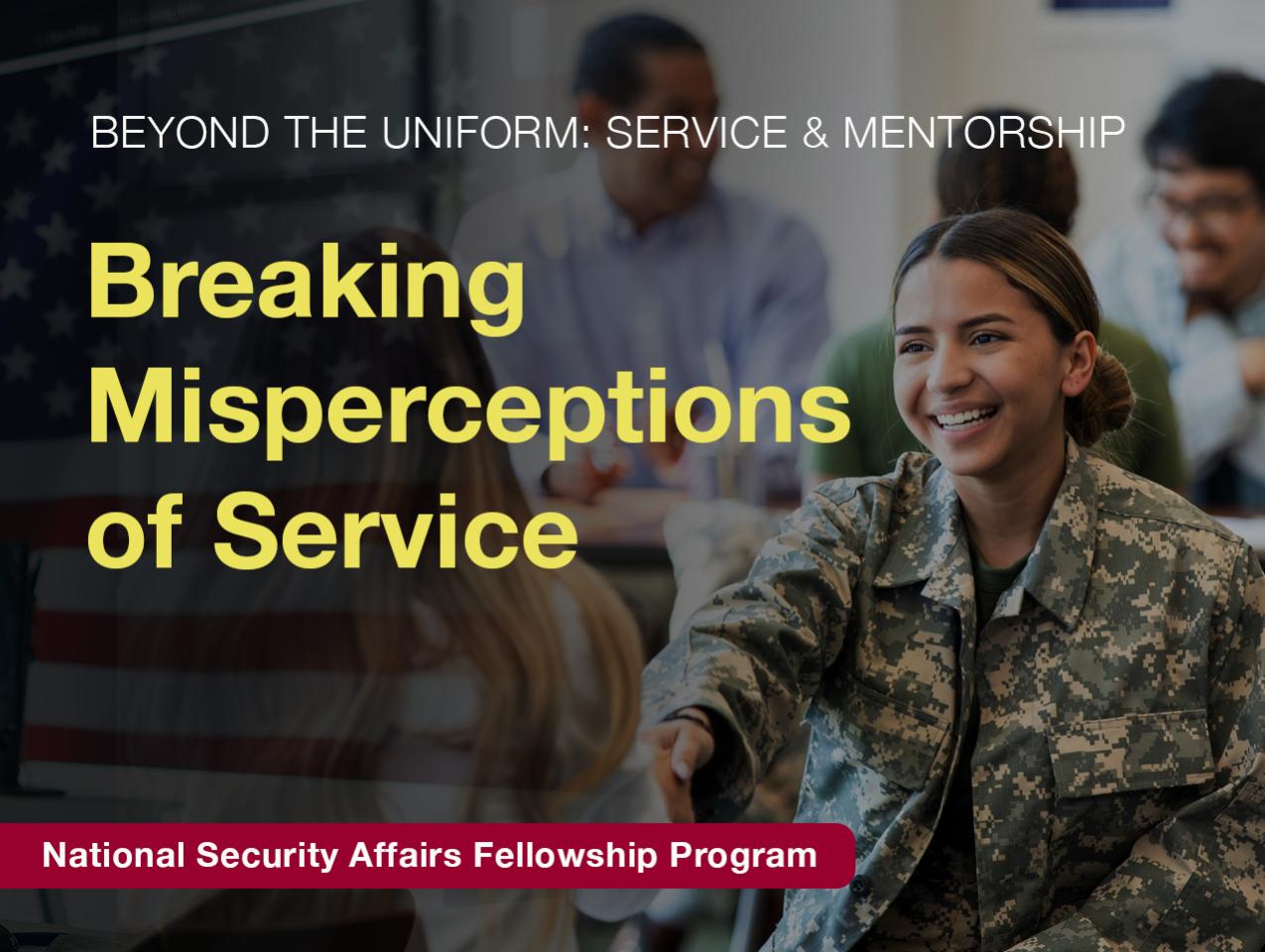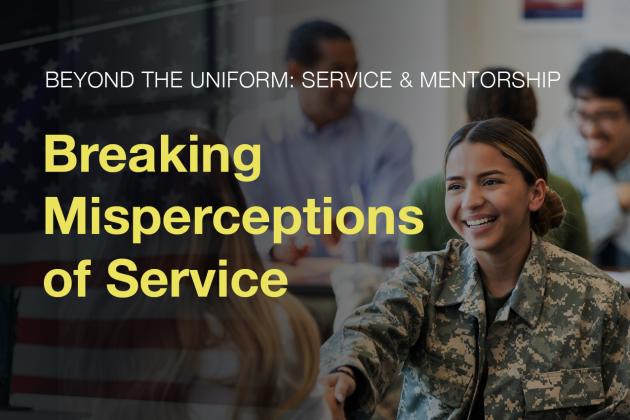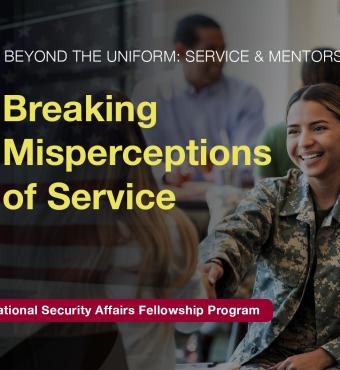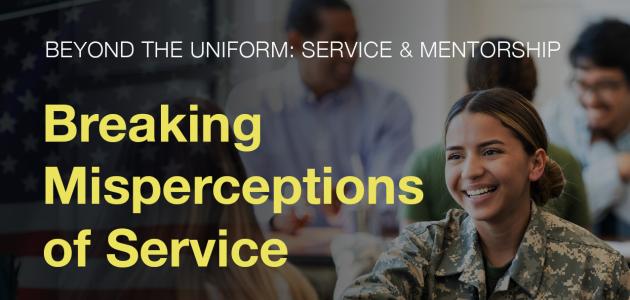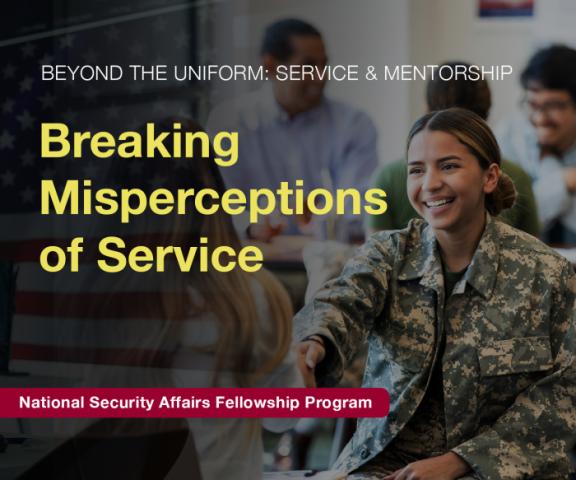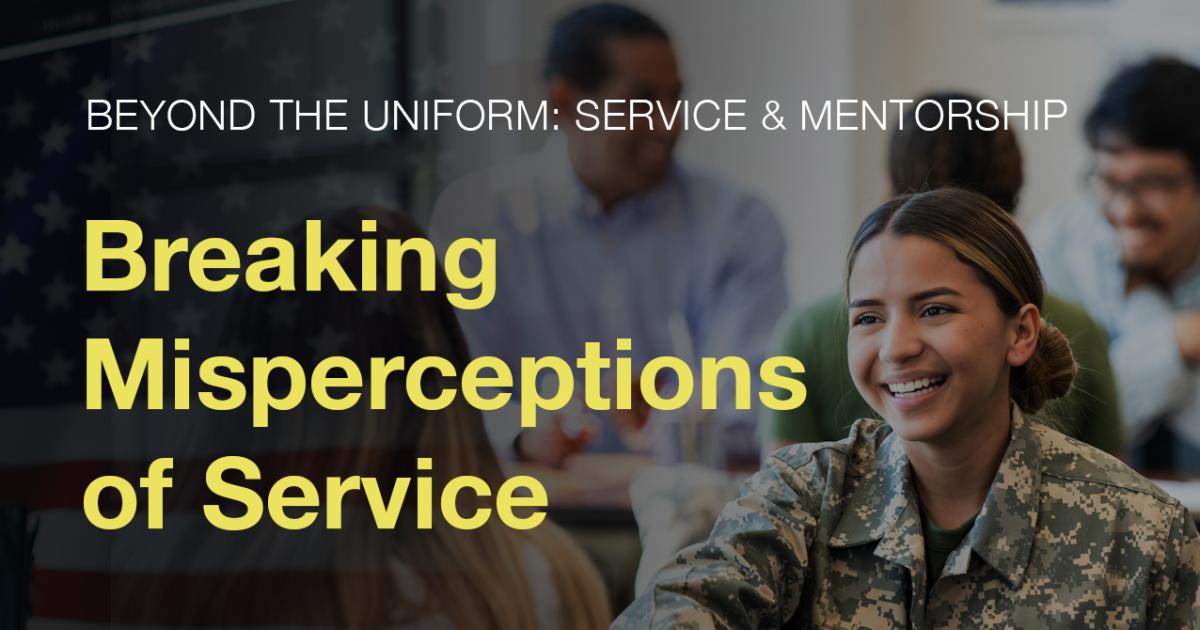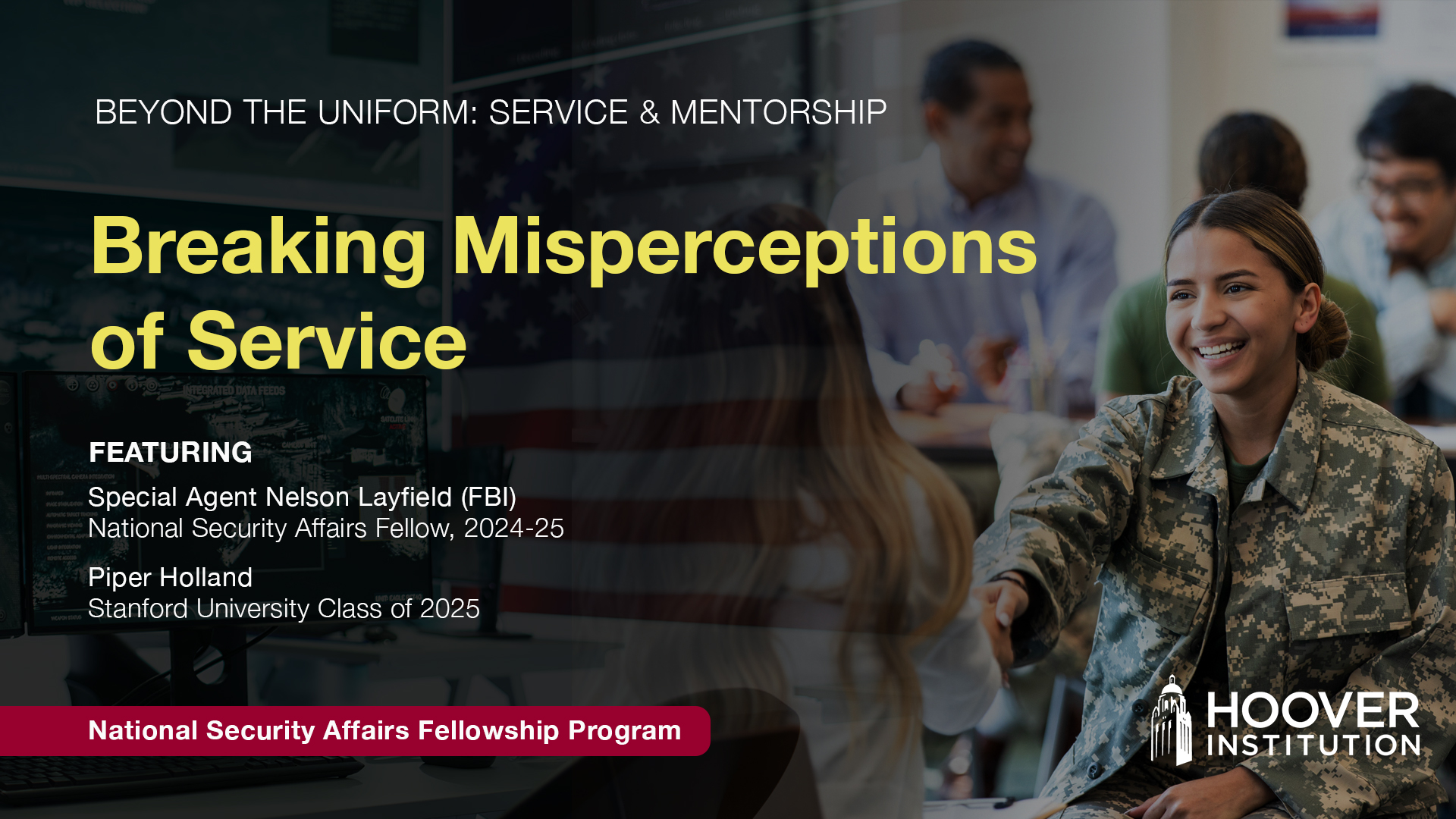Special Agent, Nelson Layfield (FBI), along with Stanford University student Piper Holland break down common misperceptions about what it means to serve one’s country.
WATCH THE VIDEO
>> Nelson Layfield: The sheer number and complexity of simultaneous events going on around the world at any given time right now is just such a challenge. We all know that there's a challenge with China, there's a challenge with Russia, but in thinking about the continuing challenge with the Middle East, and thinking about maybe new emerging challenges with.
When we think about recent events in the news, the conflict between India and Pakistan, it's just a lot to deal with all at the same time. And switching back and forth between the issues and understanding what are the best levers of international power to use when it comes to either using diplomatic power or informational assets, or if the military is the right response or economic power, thinking about those threats, thinking about those issues all at the same time, it's just such a complex environment, and I don't think it's going to change.
I don't expect it to change anytime in the near future. Well, in my case, as a representative of the intelligence community and the FBI specifically, there are not a lot of opportunities for people who spend time on campuses, students, faculty, staff, to really get to interact and get to know people from the intelligence community, people from the FBI in particular.
And so sometimes there can be misconceptions, there can be misunderstandings. So just the importance of just having conversations, trying to find common ground and in agreement where possible, I think is just very important to make sure that I can understand folks better here on campus, and campus folks can understand me and what my perspectives are.
And just that if there's any barriers that we might start to break down those barriers with conversations, with understanding of one another and really learning perspectives from one another. So our program director, Dr. Amy Zeigert, some of the study, the work that she's done in her academic career, she talks about the intelligence community, and she has this book in this class that she teaches on campus, Spies, Lies and Algorithms, in which she makes the point that for most people in the country, and this includes politicians, which is kind of amusing, what they know about the intelligence community and about the FBI comes from TV shows, it comes from movies.
And so not all of that is accurate. And so, again, to really give a more realistic portrayal of what life is like in the FBI, what really is the nature of our work? Also, trying to dispel any myths is an important aspect of it. So being able to do that, spending time with the students, getting to know the students, you know, this program is by design, very unstructured.
The only thing we have to do is, is we have to be engaged in the course that we teach and we have to be engaged with the students that we're assigned in our mentor and mentee relationship. Other than that, we have a lot of flexibility in what we can do with this program.
So the time spent with the students in the large classroom setting, in the smaller group setting, it's just been phenomenal to really to form relationships, to become friends with my own mentees that have been assigned to me, but also those who have not been assigned to me. I know Piper and I have spent time together in other settings.
And it's just been so fun for me to get to know some of these students, get to know their perspectives, learn about what their future aspirations are, what their dreams are. Those who do have aspirations in going into public service and being able to share some of my perspectives and some of the highlights and some of the lowlights and some of the realities has really been so much fun.
Really the thing that I've enjoyed the most during my time and as an NSAF. My time in the program has been fantastic.
>> Piper Holland: I applied, looking to learn more about the Hoover Institute, to have a mentor in an area that I was interested in in foreign affairs and international relations.
I submitted my application with just my interest and an area in international relations where I felt like I had a gap in my studies. And I didn't feel like I had taken many classes on national security or knew or felt confident in my ability to discuss or debate that topic.
And so I knew I wanted to be with a mentor in an area that I knew very little about. So I was paired with Col Jerome Greco, who is a colonel in the Marines. And so we, through this mentorship, I got exposed to learning more about the Marines, the future of the Marine Corps, something that my studies on Stanford campus hasn't really allowed me to go into as much.
And so the program really is a weekly discussion with your mentor or lecture in class or a guest speaker coming in. It's a very dynamic class. It's changing every week, but I really walk away with something exciting to tell my friends, tell my family every single week. The first thing I noticed about Greco was his leadership.
I was really drawn to his ability to be a leader in the classroom, be a leader in our mentorship group. And I immediately wanted to emulate that. I wanted to take on a similar role in the classroom. I wanted to speak up, I wanted to participate, I wanted to encourage others to participate.
And so that was something I really learned early on in our mentorship. I also decided to get one on one time with him to discuss my future. I'M a senior, so a lot of questions have been coming up on what do I want to do next year, what do I want to do in the next 10 years.
And so it was really helpful to get that time and have that conversation with him to go over his early career and be inspired by a different path. I think at Stanford we're definitely exposed to a lot of similar people, a lot of similar paths. And I think it was important for me to be able to hear what other people decided to do right after college.
And so it was really helpful for me to get to talk to him and go over all my options and not feel that I only have one or two. And he really showed me that I have a million. One of the most interesting things I learned about my mentor was he was telling me about his time in D.C. because I'm also interested in going to D.C. and he told me a story about writing this memo that he just got randomly.
He wrote this memo and then something like a couple years later found out that it fully went into the hands of policymakers and got approved. And he was like 2021 at the time, so it was he had no expectation of it happening. And so I think he kind of told it as a story of like 20 year olds are running the government, 20 year olds are in D.C. and you actually can have a lot of impact in D.C. and so it was very encouraging to go to D.C. and the fact that I can make an impact even though I'm so young, I found so much value in this mentorship program.
Before joining this program, I was very lost in what I wanted to do. I had been studying film and documentary for the last four years, but also had experience in startups and in venture capital and. And so I was really torn between these two options and felt that there was no other options and not sure if I wasn't.
When I was applying to jobs, I was having a hard time feeling motivated or writing answers to why do you want to do this? And so when I joined this program, talking to my mentor, Jerome Greco and the other NSAFs. I learned that there were so many other options.
And learning about national security was so fascinating to me. And then through the program, they send a lot of internship opportunities or full time positions or other fellowships or other think tanks. And I started looking into those, looking into those applications. And those were the easiest applications I've ever written.
Like every single thing I've ever done at Stanford all leads to a career in public policy. And I had no idea, I didn't even consider going into a career in international relations until I took this course. So even though I've been studying it for the last four years, I've studied abroad.
I went to Cape Town, I went to Berlin. There was just not any option or any person that I could look up to who had chosen to go into international relations or international security that I could talk to or showed me that there was that option until I took this program.
And then ever since, every week I'm able to see how much of an impact not only this career has had on you guys, but what you guys have been able to have on your careers. And I think that has been life changing. Like now I'm planning on moving to D.C. i'm going to work and do public service.
And I'm very excited. One of the most interesting things that I learned through this program was when HR McMaster came into our class. We had read his book beforehand and, and one of the questions I got to ask him was, we're talking about a lot of things that are happening and what we're concerned about, but what are the things that we're not talking about?
So I think that was a moment where in politics and in the news, we're talking about a lot of different things, but there's always a gap in what we're talking about. And so I asked him that question and he had mentioned in his book that's what he asks.
He always asks continuously. He asked his staff, what are we missing? What are we not talking about? What should we be talking about? And his answer, I think was he was saying, we're looking at a lot at China, we're looking a lot at Russia, but we need to look at the Middle east, we need to still look at terrorism, anti terrorist acts and still have a focus on that.
And so I think that was his answer in the classroom. But I appreciated his book talking about and him discussing it in class, basically about this idea of don't lose sight of the things that we're not talking about people can get really focused on the one or two things that are very popular to talk about or everybody's talking about.
But it's important to look at the things that we're not talking about and recognize that gap. One of the things I learned about policy that was really interesting was about the CIA. I remember learning about the different sectors of the CIA and the different positions and this difference between an analyst or an agent.
And so one thing that they were discussing, I remember talking about was kind of there's two options, like, okay, if you're really into policy, or you're really into kind of doing a lot of research and then presenting that research, or if you can walk into the room and you can start up a conversation with anybody, that's the gold.
That is also a very important position. And so it was really cool to see how, yes, there's the importance of we need the left brain people who are going to be going through all this data, going through all these policies in these current events, and then helping policymakers make decisions.
But it's just as important to have these social skills and this eq, how that's very important to disclose information that we didn't have before, or building relationships, diplomatic or otherwise, with people. That's also just as important. So I think it's really important. Basically, what I learned that's very important in policymaking is to not only have this eq, but also have IQ and putting those two together to create policy.
Before doing this program, I had very little interaction with national security members or any military group or let me do that again, not a military group. Before doing this program, I had very little interaction with anyone who was part of national security or in the military. I bike past the Hoover Building every day, it's right next to Main Quad, but never been inside.
There is a little bit of this disconnect between Hoover between the military and civilians. And I definitely felt that I'm born and raised in California. I don't feel very connected to the military or national security. And so that is part of the reason why I wanted to do this program is to understand it more.
There are a lot of negative connotations. I do think there's, especially in California, there isn't a deep understanding of what is going on and why it's so important we have a large military. And I definitely was one of those people who was not sure why we were spending so much money on the military until I joined this program.
And speaking with all the NSAFs and understanding their different roles and understanding that the military isn't just about action, it's also about a deterrent. And that deterrent is why we're such a safe country. And that was something that I didn't really understand. And I also didn't really understand what the Hoover Institute was all about.
You know, it's here. Everyone knows about the Hoover Institute, but no one really knows what is going on inside the Hoover Institute. And so to be able to come on the inside and see what's going on, see the research that's being done, see the fellows that are here, I really got to connect with what the Hoover Institute is doing and have a better understanding of what is going on.
When I told my grandfather is very. He is very liberal. He's very against. Like, when I told my grandfather that I was doing this program in the Hoover Institute and he was actually pretty disappointed in me. He didn't want me to join the Hoover Institute. He was. He's very liberal and didn't want me to be around any conservative thoughts or any conservative program.
And I think that that was a bit of a deterrent for me to join this program because I didn't understand what the Hoover Institute culture was actually like. And so coming in on the inside and understanding that it's actually a place where people can have many opinions and many conversations, and those are all accepted.
It's not just one opinion or one view of national security or of the military. It's many opinions. And that's why everyone can come together and talk about it and debate it. And that was something that I didn't fully understand until joining this program.
>> Nelson Layfield: So the FBI as an organization, we are not a policy making entity, but we are operationally focused.
And keeping operations first and foremost in the front of our minds, no matter what policies might change with different administrations, is something that we have just grown accustomed to. I think the people who choose this profession probably don't necessarily come in with a, maybe a stronger interest in the policy realm, but really people that have more of an interest in being action oriented.
And so keeping that first and foremost has just been such a critical thing because I now have been through, I think this is my fifth change in presidential administration. And there's actually something comfortable and something nice about knowing that whatever administration might come through that I just need to stay focused on the work that is in front of me and the operationally focused aspects of what I do.
And yes, some of the policies have changed around me and around my organization. But because national security, the things that the FBI works on, in particular counterterrorism, counterintelligence, those aren't to the same degree as other things might be political matters or political footballs if you will. And so those things have kind of stayed the same.
And so I do think that it's important as an organization the FBI just focuses on the mission. The mission statement of the FBI is to protect the American, American people and to uphold the Constitution. And I think that's those two things are going to be constants no matter what administrative changes there may be, what other policy changes there may be as well.
>> Piper Holland: One of our classes focused on leadership. We kind of had that word map bubble of what it takes to be a leader and what are the different aspects of leadership. And I think that every single mentor got to go around and share three things that they three pieces of advice to be a good leader.
And I wrote every single one of those down. I was like, wow, this is something I'm going to come back to. And I think almost everybody had something that had to do with empathy because so many of your guys careers is hierarchical. You start in one place and then you end up another place.
And, and now you guys have ended up in that other place. You guys are leaders in your guys fields and every single one of you knew it's important to think about that person who's just starting and how they should be treated and what they're looking for, the guidance that they're looking for.
And I think that it's something that it takes that perspective to be able to understand that when you're in that position, when you're first starting, you are looking for somebody to give you guidance or be a leader. And so when you do become that leader and that mentor to somebody, to have the empathy of that person, not to forget what it was like to be that person, but to remember what it feels like to be that person and go into leadership, knowing what that person is looking for and what they need.
I'm studying international relations with a specialization in social development, which I got through my study abroad in Cape Town, and then another specialization in international institutions. So I've always been very interested in what international institutions can do for emerging economies in the global South. This program showed me more of the side of national security and so showed me that I have a really big interest in national security.
It's something that I hadn't taken classes in, and I didn't know that I was interested in until I took this program. And so I'd say that when I first came in, I wasn't thinking about going into working for the government. And then as this program went on, I saw how I could bring in my interest of international relations into a career in the Foreign Service.
And so I am now interested in pursuing a career in the State Department and with the dreams of hopefully becoming an ambassador or the Secretary of State, who knows? One of the class days, we took Jerome Greco, my mentor, to the map room in Green. We were going on a tour of campus, and we were stopping at different spots.
We stopped at Kappa Sag, one of the frats, and we got to do a tour of what that looks like. We stopped at a classroom that was important to us. We stopped at Green Library. And in Green Library there is a map room. And so we went to this map room.
They have massive globes and all these ancient maps and everything. And so we stopped at the globe and we started talking about where's the coolest place we've ever been? Or where's the place that we've always wanted to go. And so I was saying that I had been to Mongolia, and that was a very impactful, amazing experience to me.
It was unlike any place I've ever been before. Another student was saying how they had been to India, and that was very exciting. And then we got to Greco, and he was talking about his time in Afghanistan. And so he was explaining his tour in Afghanistan. We were looking at the map, and he was tracing with a finger along where he went with his.
With the troops. And so he was leading a troop from one city to another. And he showed us the distance and how long that took. And so he's told many stories of his time in Afghanistan, but to actually see it on the map and see him trace it with his finger of how long it took and what it was like, just really brought that experience to life and that he was there doing that at the same age as me now.
So it really brought a lot of my life into perspective and my experiences, because he was showing me where he was. Basically, on this date, at my age, we were invited to go to the Future of the Marine Corps presentation early on in the program. And so I showed up.
I was the only student there. Everyone was in suits. There's all these military guys in suits. And I showed up in just my student clothes. And I'm watching this presentation. They're going through, you know, all the weapons that they're building, all of the threats that they're monitoring, and there's a lot of acronyms.
And I'm like, okay, what's that one mean? What does this one mean? And so I was trying to keep up in understanding what these Marine Corps acronyms were. But still, I found it very interesting that they were going through. We had just had a class on the major threats that the students see to our national security versus the mentors.
And then I went to this Marine Corps talk, and they were saying specifically what the Marine Corps thought were the biggest threats. So it was very interesting to be able to compare what the students felt were the biggest threats, what the mentors felt, and then what the Marine Corps felt, because there were a lot of similarities.
Everybody said China, everybody said Russia, but there were some that. I don't think the students. We didn't say terrorism at all. I don't think we said bio warfare at all or anything of that sort of. And mentors had different answers. And so it was interesting to go and see how everybody does have a different role to play, and everybody does see national security differently, and the threats to our national security.
Security differently. And so in that talk, what I found the most interesting was this predicted simulation of a conflict in China. And I had learned a lot about nuclear deterrence theory in my classes and a lot of IR theory. And so I hadn't seen it put into play.
And so what does all these IR theories look like in real life when there actually is a conflict? And so I raised my hand, I was like, this is a very interesting model of what a potential conflict in China might look like. But where does nuclear deterrence theory come into play?
Is this before nuclear, like proliferation or, sorry, is this before nuclear is used as a threat, is it not? And they were saying, explaining basically at what point nuclear weapons are used and when they are not. And so this scenario was under before, basically nuclear weapons would have been used.
And it was fascinating for me to see this and see that they're thinking about it and know that a potential conflict in China is very much possible and that they are preparing to deter that and not go to war with China. But it wasn't something that I was aware of before and it definitely shocked me.
I was very shocked to hear, wow, like a war with China is possible. It's something that they're thinking of. And I think that's something that I really took away from that particular presentation was these are real things that I'm studying in class. A conflict in China isn't just a paper that I'm writing on, it's something that potentially could happen and learning about how national security, different national security branches are working towards deterring that from happening.
So it really was putting a lot of the stuff I'm learning in class into practice and seeing it in real life and see how that would play out. Throughout the course of this program, a lot of my opinions have changed, been challenged, been reinforced. All of the above, I think for sure what has strengthened is my knowledge of what wanting to go into some sort of branch of national security.
I am very excited to pursue a career in the Foreign Service and I think I started very optimistic, very excited about going in. Obviously over the last couple months, the Foreign Service exam got cancelled. There isn't this clear pathway into working for the State Department. And I think that is a big deterrent.
A lot of students at Stanford are now not looking to go into the public sector at all because it is so difficult to go in there at this point. And so I think one thing that I've really taken away is how important it is to have avenues for young people to be able to interact with the public sector and, and to go into a career in public service because the harder you make it, the less students are going to be able to, and the less they're going to.
And they're just going to go into the private sector because there is a clear avenue to go into that. A lot of other students are doing it. And I think that it's really important to have those opportunities for young people to go in there and have that confidence in the government and have an affiliate, an affinity to the government, because then they'll be more excited and have more trust and care more about where it goes.
And I think the more people are blocking the ability to go in and to start their career in the public sector, the less people are going to feel that connection or feel that affinity to the government.
>> Nelson Layfield: No, not that I didn't already realized this, but my time here as part of the NSAF Fellowship program and with the students has made me just take into account more often that really my time working in the national security field, it's coming toward the end.
I still do have some time left, but I'm definitely in the back half of my career. And it's people like you, Piper, the students in our class who are going to be the next generation of people working in national security, national security leaders, foreign affairs leaders, and you know, that's getting to know the students and just being impressed by just how curious and inquisitive and how insightful the questions are that you ask has just really made me realize that, number one, we are going to be in great hands going forward.
But number two, that I also have a bit of a responsibility, as I am in the latter half of my career, to be more intentional about telling some stories about some of the hard earned lessons that I've learned, some of the experiences that I've had, some of the things that I've done well and that have worked out great and some of the things maybe that I haven't done well personally or maybe that I've seen that haven't worked out so well with either my organization or with the government at large.
Just passing along that wisdom, whatever wisdom I do have to pass along, just passing along that knowledge. And I know that, Piper, you and others who go into national security, you're going to chart your own course, no doubt about it, and you're going to make some great decisions, you're going to do great things for the country.
But I do think that for all of us, myself included, for every generation, there's value in learning from those who have come before you, just so that we don't all have to try to reinvent the wheel, if you will. And so thinking about this new generation, the next generation coming up, and how can I be more intentional about sharing mentoring?
And we got some opportunities to do that as built into this class, but really just making myself available as much as possible to answer questions, to give perspectives, and to just be a resource in any way that I can for those who are going to take the mantle going forward.
I have had the utmost confidence in the next generation and people like Piper and some of the other students in our class that have expressed an interest in going into natural security. You know, one of the things that really struck me is that over the course of our time this year, we have had the opportunity to have in our class some really important figures in national security, some luminaries, really, from former Secretary of State Jim Mattis.
We've had former National Security Advisor H.R. mcMaster, and just most recently, former Secretary of State and the Director here at the Hoover Institution, Condoleezza Rice, come to the class and tell about their experiences and stories. And without exception, every single one of the instances in which we've had them with us as our guests.
The students, you in particular, Piper, I can remember, have really not been shy or bashful about asking some tough questions, about asking some insightful questions, and even at times, I think maybe challenging some of our luminaries, people like former Secretaries of Defense and state, just with some of the things that they have experienced and decisions that they have made, some of the things that they have maybe written about experiences in their books.
But even just most recently with Secretary Rice in our class, she made a comment about something going on in the current Russia, Iran, excuse me, the Russia, Ukraine conflict. And one of the students in the class who had, I think some family history in Russia, Ukraine area, respectfully, of course, but asked Dr. Rice to maybe give something a little bit more consideration.
And so seeing that just the independence of thought, the willingness to ask hard questions, the willingness to engage in difficult issues, the willingness to be able to re examine assumptions, examine biases, and to be teachable and be willing to learn. I've seen so much of that throughout this whole year from so many of the students.
And as I have just been around that, it's given me such confidence that I know that in the future, the decisions that need to be made, those who are going to be in positions to make those decisions, people like you, Piper, that as I get older, I am going to be just, I think, taking comfort and solace knowing that we just have such quality people and people who are taking leadership and learning the lessons of national security so seriously and helping them to formulate the decisions that are going to be made in the future.
ABOUT THE FELLOW & MENTEE
Nelson E. Layfield, national security affairs fellow for the academic year 2024–25 at the Hoover Institution, is a special agent representing the Federal Bureau of Investigation. Since 2004, Layfield has conducted counterespionage and counterintelligence investigations, as well as public corruption and civil rights violations. He currently serves on the Counterintelligence Task Force, where he works to increase awareness and thwart instances of transnational repression and malign foreign influence.
Piper Holland is a senior at Stanford University where she is majoring in International Relations. While at Stanford she studied abroad in Cape Town focusing on transitional justice and development in the Global South, and Berlin where she focused on international organizations including the EU, UN, and ICC. Her senior year she became the Lead Ambassador for all of Stanford’s Bing Overseas Study Programs. Piper minored in Film and Media Studies and has produced several mini-documentaries focused on international issues in Hawaii, Estonia, and Peru. She has lived, traveled, and/or studied in over 40 countries and speaks Spanish. She is a member of the Stanford Ski Team and Pickleball team and works as a volunteer for Conservation Ambassadors (wild animal sanctuary focused on education), Habla (teaching English to Stanford Spanish-speaking field workers), and Kids with Dreams (supporting individuals with special needs). Piper aspires to become a career foreign service officer in the State Department with a dream of becoming the US Ambassador to the UN or US Representative to another of the major international organizations.







